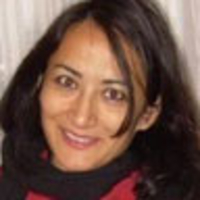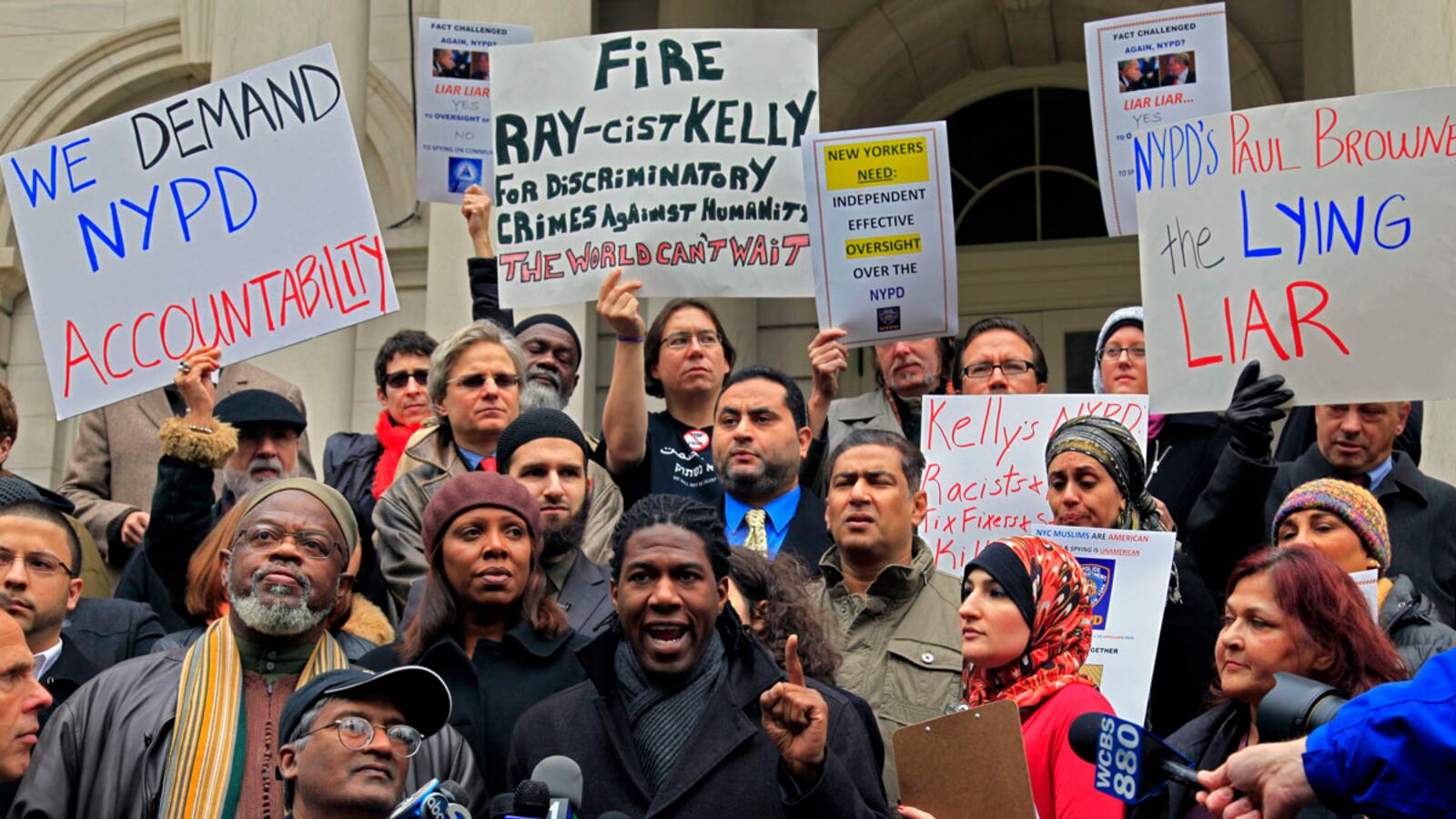Early last month The Associated Press broke a story, “NYPD Document: Gather Intel Info at Shiite Mosques,” exposing a secret 2006 New York City Police Department report about the possible influence of Iran’s intelligence agency in the area. The report, by the NYPD’s Intelligence Analysis Unit, included an inventory of New York and New Jersey mosques and Muslim groups predominately affiliated with the minority Shia sect of Islam that is the majority faith of Iran.
And then came “NYPD Monitored Muslim Students All Over Northeast,” based on another leaked internal NYPD document that chronicled how the department tracked Muslim Students Associations at schools including Yale and Rutgers.
That was followed by the release of another 2007 NYPD report, by the police agency’s “Demographic Unit” and the Newark, N.J., Police Department’s criminal intelligence unit, with itemized places that were a “location of concern” in Newark, from area mosques to restaurants frequented by Muslims, including Kansas Fried Chicken, a place run by folks of Afghan descent, according to the report.
The AP dispatches sent shock waves through the American Muslim community. The Council on American Islamic Relations, a conservative Washington, D.C.–based group that pitches itself as a civil-rights group for Muslims, called for an investigation. Its New York chapter launched a protest in front of the NYPD headquarters scoring headlines like “CAIR-NY Calls for Oversight of NYPD Over Mosque Spying.”
As a Muslim whose father, Zafar Nomani, was one of the founding members of the Muslim Student Association at Rutgers University in the late 1960s, I’m relieved that our country’s largest police agency was monitoring our Muslim community as closely as the reports indicate. For the longest time I have worried that our sense of political correctness has kept us from sensible law-enforcement strategies that look at Muslims, mosques, and Islamic organizations.
According to one NYPD report, the intelligence unit would send “rakers” into the Muslim community—police officers whose ethnicity and language skills matched the places they were monitoring, including “flophouses” and locations of interest such as a “coffeehouse, gambling hall, house of prostitution.” As far I’m concerned, we need plenty of raking.

Last year, I argued: profile me. This year, I say, too: monitor me. Indeed, just as we need to track the Colombian community for drug trafficking and the Ku Klux Klan for white extremists, I believe we should monitor the Muslim community because we sure don’t police ourselves enough.
Public spaces, especially those protected by religious sensibilities, are a natural meeting spot for criminals. If the NYPD was tracking shopping malls or pizza shops where criminal activity is being planned, we wouldn’t complain. Because the places are religious institutions, we’re protesting. Alas, criminals use our religious protections as a weapon against us.
There are other Muslims who believe law enforcement has to do its job. A New York City physician, Qanta Ahmed, penned a New York Post column, “Islam & the NYPD: Why We Should Cheer Cops’ Work,” arguing, “The relentless campaign to paint the NYPD as Islamophobic is itself an offense to Islam. In fact, our faith compels American Muslims to stand with the NYPD.”
Today, a group of Muslims is heading to 1 Police Plaza to “stand with NYPD in their efforts to counter Muslim radicalization.” One of its leaders is Zuhdi Jasser, a Phoenix physician and president of the American Islamic Forum for Democracy. Since his testimony last year to Rep. Pete King’s controversial hearing on radicalization in the Muslim community, he has rallied a network of Muslims in a new venture, the American Islamic Leadership Coalition, that includes gadflies in the Muslim community against extremism, including Canadian-Muslim leader Tarek Fatah.
The last 15 years of battling extremism in our Muslim community has revealed one truth: mosques and Muslim organizations are institutional spaces used by Muslims intent on criminal activity, not much unlike the pews of a Catholic church or a Godfather’s Pizza might be the secret meeting spot for members of the Italian mafia.
Police and intelligence files reveal the Sept. 11 hijackers used mosques in Germany and the U.S. to organize. So, too, did the men behind the 1993 attack on the World Trade Center. FBI records, chronicled in journalist Deborah Scroggins’s excellent book, Wanted Women: Faith, Lies and the War on Terror: The Lives of Ayaan Hirsi Ali and Aafia Siddiqui, show how Siddiqui’s radicalization blossomed as a member of a Muslim Students Association in the Boston area before she launched a career that landed her a moniker as “Lady al Qaeda” and a conviction last year in a New York court for attempting to kill a U.S. soldier in Afghanistan.
My father’s generation of MSAs had a different flavor. At the Rutgers MSA, the adviser was a Jewish professor, a president was from the minority Shia sect while many members were Sunni, and membership was open to non-Muslims. Granted, today’s MSA is nicknamed “the Matrimonial Student Association,” because so many young Muslims use it to find marital prospects; inside the community, most chapters are considered harbingers for the most conservative interpretation of Islam. For example, the MSA at Golden Gate University in San Francisco includes in its suggested reading list a real keeper, Women in the Shade of Islam, a book by a Saudi cleric who writes, “Although beating of women is forbidden, Islam permitted it in restricted and very limited occasions and only when it is required as a final treatment of a persistent situation, i.e. when a wife disobeys her husband’s instructions for no visible and acceptable valid reason.”
We shouldn’t blast good police work. In the Muslim community, we should be part of the solution that smokes out radicals and the extremists. We have a duty to our community, our faith, and the nation we call home to shift to a more proactive role, ridding the community of extremist interpretations so that the police can move on to the next big criminal threat. An ounce of prevention is worth a pound of cure. We’re still finding and facing threats on a regular basis from Muslim extremists. This is a game that we lost on Sept. 11.
Sure, we’ve got folks who can take their investigations to an extreme, but we have to trust that our law-enforcement agencies have checks and balances in place. We certainly have civil-liberties groups as watchdogs over them.
We need to recognize that it is an interpretation of Islam that is the problem. We do have a Muslim problem in the world today. Jordan has recognized this. It has trained imams and scholars to deradicalize Muslims. Granted, some overreach their roles, but the security agencies of most Muslim nations recognize the extremist problem is a threat not only to other countries but to their own governments.
While the hand of security agencies in militant activity makes the situation in Pakistan complicated, in Karachi, the Pakistani police know the mosques and the Muslim organizations that churn out radicals and offer them safe haven. Like the NYPD tracking the Newark restaurants where Muslims congregate, Karachi police have a local spot they have on constant surveillance: a restaurant called Student Biryani, selling a rice dish popular in the country. I learned this tracking the police case against the militants involved in the kidnapping and murder of Wall Street Journal reporter Daniel Pearl. The mastermind, Omar Sheikh, met with his logistical chiefs at Student Biryani, and the police report reveals the men even took some biryani home as carryout. Militants can easily huddle in Student Biryani’s crowded restaurant space and get a hot meal and much-needed noise.
The Karachi cops also know that they have to track activity at mosques such as the Binori Town Mosque and others where radicals congregate. Criminals use mosques as safehouses. I know this too from the Pearl case. The photos of Pearl in captivity were dropped off during the busy Friday prayer at the Sabeel Wali Masjid, or “The Mosque of the Way of the Trusted One.” (This is in part what led me to fight for the entry of women in mosques, because the irony didn’t escape me that too many mosques are safe spaces for criminals but not for women.)
Pakistani police make no apologies of monitoring Student Biryani or the “Mosque of the Way of the Trusted One.” Neither should the NYPD. And as Muslims, we should in fact open our doors to the surveillance and help the cops smoke out the criminals in our community, so that not just our mosques but our communities are safe spaces for the trusted one.






